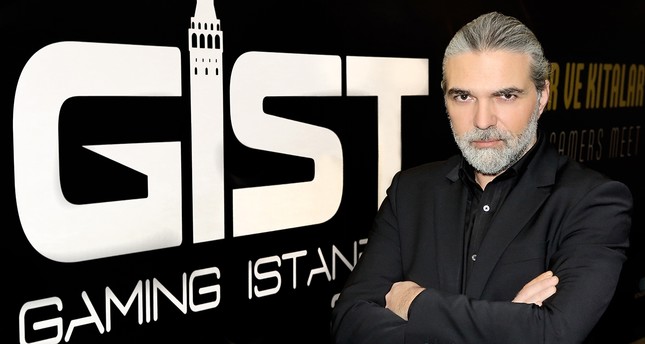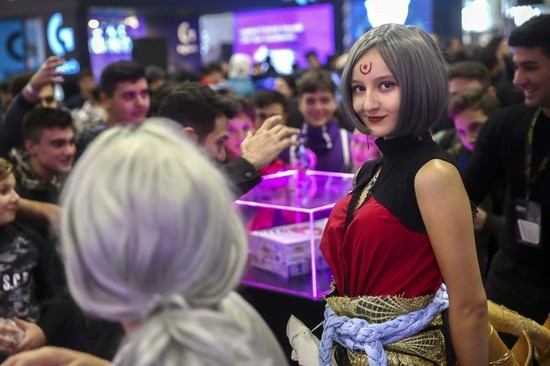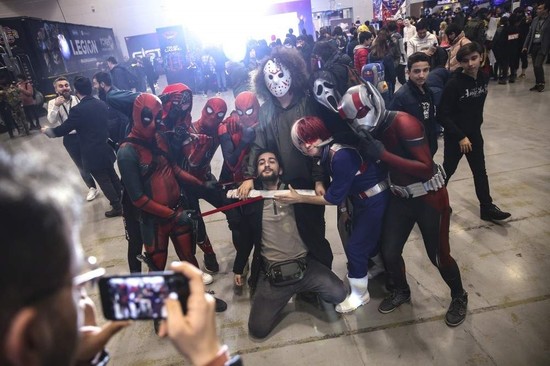
How Turkey can gain the edge in esports: An interview with Meriç Eryürek
From how to get into a career in the esports industry and advice for parents of game-crazy kids to what the future holds for Turkey, here's the 'GIST' of all things gaming
by YASEMIN NICOLA SAKAYNowadays gamers are not just teenagers who live in dark, damp rooms staring at screens – it's people like you and me, working people, people with social lives. The figures show this as well. The esports, gaming and entertainment industry is booming, streamers and influencers are sprouting everywhere and hundreds of new games are released every week. But is this all just some big hype that will eventually lead to nowhere or is this our digital future? Where is Turkey's place in all of this? To discuss all things esports and video games, we sat down with Meriç Eryürek, the brand and marketing communications manager of Gaming Istanbul (GIST), the fifth edition of which is currently underway at Eurasia Show and Art Center.
For all of the concerned parents out there, we started with the impact of technology and screen time.
"Isn't all of this gaming and sitting in front of a screen unhealthy?" I asked. Eryürek said nowadays it is really hard to escape the cusps of the digital world, especially considering that technology is now an indispensable part of our lives.
"I used to call myself a hardcore gamer but now, especially when I think of the hours I play (videogames), I am nowhere near that. With us (gamers) it's a battle between gaming and sleep, and in the end, sleep usually loses. My wife is the same, naturally, our child is growing into a gamer too," he said.
He said when it came to controlling the time their child spends immersed in electronic devices, he and his wife had differing opinions.
"My wife pursues a more conservative approach, arguing that we should restrict the child's relationship with electronic devices until a certain age, but I tell her that kids have been born into this space, and under the current circumstances, it doesn't seem plausible."
"Our kids will live with artificial intelligence (AI); they will not be like us," he said, adding that no matter what we do, we won't be able to stop them from learning about the electronic world.
However, he said there are things parents can do to make their children's experience with technology more positive.
"What we do is guide them toward more educational games, such as robotic coding, games like Minecraft. We always check the content of the games," he said.
For hand-eye coordination, Eryürek suggested Beat Saber as a good option but cautioned parents against believing in the hype that first-person shooter (fps) games contributed much to their child's development. "At the end of the day, it is not physical exercise, and we always need balance in our lives, especially when it comes to our children," he advised.
On the topic of ways to combat excessive hours of gaming, he said jokingly, "We say no, our child makes us say yes, and we eventually find a middle ground."
When asked what advice he would give to parents whose children wanted to become the next big gamer or pursue a career in the gaming industry, he said there were three ways to become a "pro" in gaming.
"If I had another shot at life or 'an extra life token,' I'd surely choose the game development side of things. When I was young, game development wasn't really a proper job in Turkey. It only recently became an occupation," he said.
Eryürek stressed that it was not at all like what it seems from the outside and it is actually a very demanding job, requiring "high profile, top performance" as developers need to be multidisciplinary. The gaming life is certainly not for everyone, he said, especially those who love their bed.
"The kids have to forget about sleeping or having a social life. You need to give up a lot of things to become a game developer," he said.
He underscored that no one could do this job without "loving it 100%," otherwise it would become unbearable.
"Going to university won't help you. You'll have to follow the Steve Jobs tactic and do not as the teacher says but do as they do. They need to be improving themselves in line with that profile," he said.
The second choice is to be a professional gamer, which is what "YouTubers and influencers do these days," according to Eryürek.
Although there are "professional esports players," the world is ever-changing and it is not clear when this hype will fade or end, he said, calling the career path "a very risky one."
"I just say do it at your own risk," he said.

The streaming life
He said that in the current climate, streamers were much more successful in turning gaming into a job and getting paid for it. Eryürek listed a few good hard and soft skills that people need to make it as a streamer.
"For starters, you need to be comfortable in front of the camera. You need to be able to talk to a crowd," he said, adding that in a sense, they have to be presenters and public speakers.
"There are too many limitations to become a gamer streamer if you ask me," he continues.
"Why? It's because they have to be online 24/7. Each and every word that comes out of their mouths has to go through a filter. Self-created content also means self-created brand so they have to work to preserve their brand value and branding skills. They do not have the option to be someone else, they have to be genuine," he said.
He said that streamers usually earn money via sponsorships, which in itself poses its own set of challenges.
"For example, if a coffee chain decides to sponsor them and asks them to sell one of their products, this contradicts their nature. They need to find a way to make it look organic and natural, which will certainly be via product placement," he said.
Eryürek said being a streamer was first and foremost a business that involved arduous tasks like brand management, content creation and some serious network engineering. He said companies and agencies expect a lot from these public influencers.
"In addition to their performance, we want healthy acquisitions, good sales and conversion rates, as well as sustainable projects," he said, likening streamer children to Olympians in training.
His advice for those who intend on going down that road? "You cannot do it without the hardware, and you have three paths to take."
The first is when you play to please the eye. "Think of it like the modeling industry. But in our world that is not sustainable," he said.
The second method is what gamers call "grinding," where they play and stream live consistently for eight to 10 hours a day. This usually helps the streamer reach a certain core audience but if the content is not right, that eventually falls through too.
The third and hardest method by far is when gaming becomes their life. To achieve this, streamers must work a grueling 20 hours per day, every day and forget about any holiday.
"They need to dedicate themselves to this job completely. What about pay? In the end, they earn as much as celebrities but their success is hanging on by a thread," he said. The life of a gamer is different than that of singers and other celebrities in the way that "they cannot be tired or sleepy as they always have to be active and online."
"It's not like you prepare for a performance and then it's over. You are putting on a performance constantly," he pointed out.
"They need to be completely honest and share with their audience when they aren't in the mood or if they are tired. They need that kind of social ease to say that," he added.
Coming out on top of those search results on search engines is no easy task, and also requires incredible networking and influencing skills. "The only way is to be well-equipped and work 20 hours a day," he said.
Then we got talking about the current situation of the gaming industry in Turkey and what the future holds.
Eryürek said Turkey lacked the necessary infrastructure and forward-facing strategy as well as an established business model.
"The only thing there is is this big hype about esports. I see this as a great risk so I don't guide my students down that path. I tell them to see it only as a hobby for the time being."
Acknowledging that he is one of the very few sharp-tongued people in the industry and goes against the grain, unlike most, he said: "I consider myself one of the oldest in the area. I'm a realist; I've seen many hypes – I've witnessed the Dotcom craze."
Returning to the topic of professional gaming, Eryürek reiterated that it was a "risky affair of the heart." He added that he hopes esports will settle down in about two to three years in Turkey.

Turkey can blaze the trail
He said the biggest setback in Turkey was that there is no predetermined or pre-planned method to follow that also incorporated the consumer into the process.
"The only way to create organic and sustainable business models is through including the consumer. This we can achieve by getting over this hype and establishing a gaming culture," he suggested.
Underscoring that the global gaming market had reached a staggering $136 billion at the end of five years, esports' share in this had reached about $1.2-1.4 billion.
We also touched on stereotypes and outdated notions that women cannot be as good as men when it comes to professional gaming.
Eryürek was dismissive and said that he could not believe that people were still discussing such trivial things.
He said that in times when women compete against men in physical sports and can actually beat them, or when they fly to the moon despite some biological challenges stemming from having different physiologies, "it's utterly stupid to be discussing definitions of men and women in today's digital world."
However, he said there were key differences between male and female players when it comes to gaming. "Women are much more strategic, they are pre-planners and are better executors, while men can make decisions faster but try to formulate the results later," he said.
He said that mixed-gender teams had the power to change the future of esports.
"If we can just break that dogma and stop making a distinction between female and male esports players, I think everything could be much different. This, I think, is a great opportunity, a chance Turkey has to take," he said.
He said if Turkey can drop that "mixed" adjective when referring to esports teams, that's when it will outshine its competitors and actually make a place for itself in the market.
Then we returned to Gaming Istanbul (GIST), which is also blazing a trail in Turkey and Europe. Eryürek said it was born out of necessity.
"It was ultimately just a business idea but there was this gap in the market, right between China and Germany. There were no international gaming and esports fairs within that area. The only one remotely close was Russia, which is not international," he said.
"So we thought, 'Why not have one in Turkey?' Why not make Anatolia a gaming bridge too between Eurasia after centuries of being a bridge for trade?" he explained.
He said the idea seemed feasible, and there was, of course, the Istanbul factor, which has a grand population of 16 million in their favor.
With the gaming market oversaturated in Europe and Asia and firms failing to make sales, all eyes seem to turn to a yet-undiscovered market: the greater Middle East.
"Including Turkey, the region's population corresponds to about 29% of the population yet no marketers had pitched here yet. It was a virgin market," he said. The rest was history.
GIST, now in its fifth year, has been gradually but consistently growing each year, recording about a 30% growth every year. It is the Middle East's largest as well as one of top five gaming expos in Europe.
Eryürek said that "they believed the time had come for support from public institutions. He said similar organizations worldwide received all kinds of support from the city itself as well as the country. For example, when Gamescom is held in Cologne, all buses and metro services become free of charge. Over 350,000 tourists come to the city, and spend more than the average tourist."
"(The industry) is not great in this country, but it can be," he said, giving South Korea and Romania as examples. He added that he saw great potential in Turkey in terms of production.
"If we can train and educate the youth well – which means about half of the population – and start producing games for the world market, we can make great money," he said.
"Five hundred to 600 games are released each week. The foundation of a lot of these games and their storylines were born out of Anatolian culture," he said, underscoring that our historical heritage and rich culture could be translated well into gaming.
He said Turkey had lost its edge along the way but now was the time to take the bull by the horns.